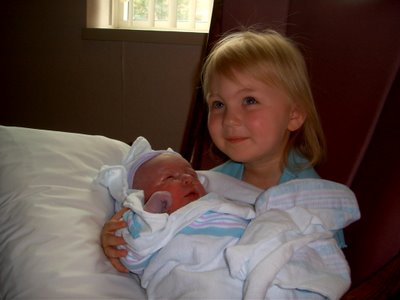Learning to Pray
 Prayer is powerful. It changes people. It's not just about talking to God, but also about listening to God speak to us.
Prayer is powerful. It changes people. It's not just about talking to God, but also about listening to God speak to us.
O.K., so where am I going with this? This isn't anyting that we haven't heard a million times in Sunday School and children's sermons. But tonight I heard God speak to me through the voice of my three year old daughter, Maya. This was her prayer at bed time (for which she had me repeat her after each phrase):
Dear God,
I like to eat.
Help us to feed us.
Help us to feed you . . .
to other people.
I love you.
I love you.
I love your people.
You love me and the people.
Thank you, God.
O.K. Alright.
I pray to your nose.
I pray to your mouth.
Your eyes and your ears.
And your fingers.
O.K. Alright.
Ahhhhhhh-men.






3 comments:
Hey Kevan,
I knew theology ran in your family, but...wow! Sometimes the instinct of someone so young can really stretch us, and show us what we know to be true in a whole new way.
We're leaving MT on the morning of August 14--maybe we can get in touch on the way back.
-Tim
"Help us to feed you...
to other people."
Can I assume that this line is a result of Maya's taking communion at such a young age? Already she has been able to articulate how the body and blood of Christ given to us in bread and wine can be taken into this world through the body of Christ called the church. Awesome!
I've thought a lot about communion age and pros/cons about communing kids at a earlier age (like Maya's) versus an older age (which seems 5th grade is the standard in our denom.).
My thinking has taken this direction as of late: do we prevent spiritual formation in children by our own practices of making them wait until a time that they can 'articulate' the fundamentals of communion for us? Are our own practices to blame for the lack of spiritual maturity in people?
Case 1: A kid must wait until 5th grade to commune. This child has watched her parents commune, has heard a couple of sermons preached on it, has been through the classes, and is now 'prepared' to receive communion. By the time this child is 18, she will have been communing for about 8 years.
Case 2: A child is communed at a much earlier age (preschool or kindergarten). The parents were the primary instructors in 'preparing' their child to receive communion (i.e. hold your hands like this, say this little prayer, this is what we're doing), then the church steps in with some 'formal' instruction throughout the coming years (at least one dedicated class, then plenty of follow up at all levels of faith education). By the time this child is 18, she will have been receiving communion for over a decade and it will have been reinforced for her at multiple levels throughout her faith education in the church.
How do those extra years translate in terms of spiritual formation? As I can see in Maya and other children like her who have been communing at a young age, it's not a 1-to-1 correspondence. The extra time at the table is invaluable in how she sees herself, God, and her world.
Priceless!
You two are blessed with Maya. What an amazing prayer. When did she start taking communion? I've long wanted my son, 2, to have communion, but our pastor doesn't agree with the practice of infant communion. Officially, our congregation members wait until 5th grade, but since I'm the First Communion instructor, I've been getting exceptions (with the pastor's approvals) for children in second grade.
But even that has been difficult, since some congregation members disapprove of allowing small children communion.
It was really brought home to me when my son received communion at a Methodist church. The next Sunday, back home at our Lutheran church, he looked up expectantly and opened his hand. But he was passed by.
We don't refuse to commune people with Alzheimers' or others who can't articulate the full meaning of the Eucharist. Whether to allow small children early communion seems to be up to each ELCA congregation.
Meanwhile my kid and others his age aren't included in the Lord's Table unless they're not worshipping "at home."
Post a Comment